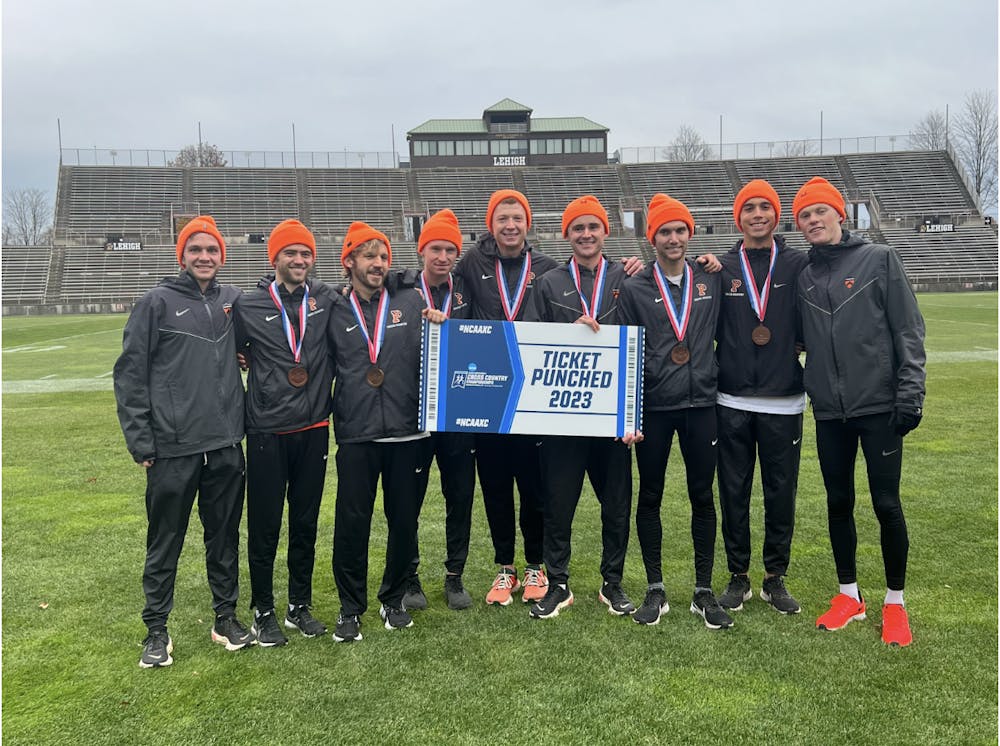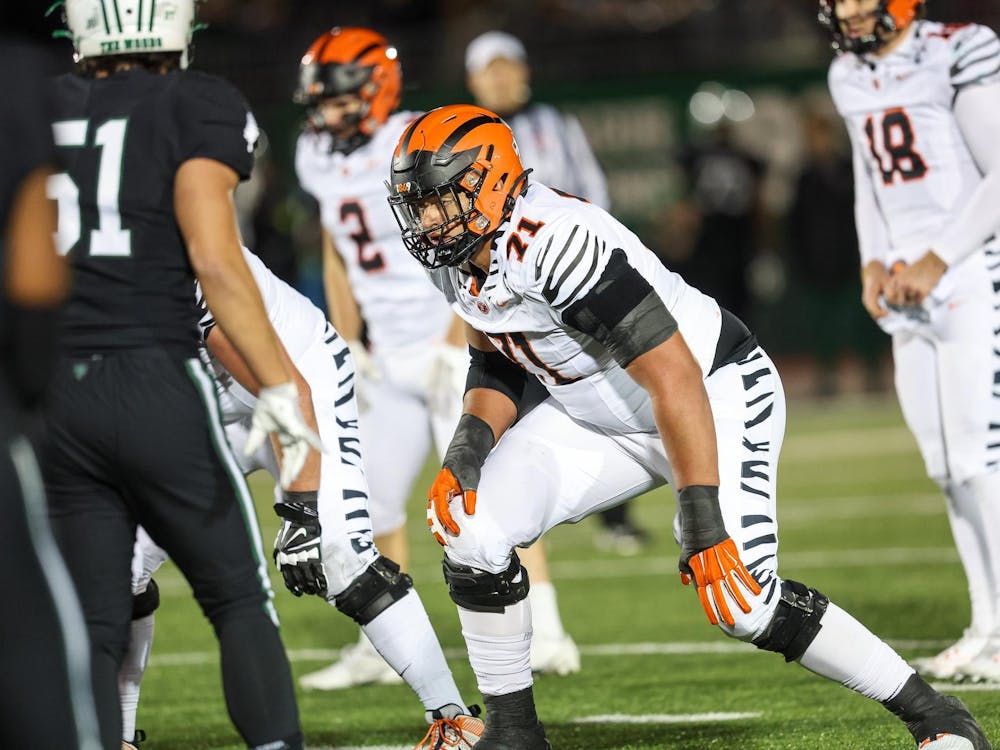At the NCAA Mid-Atlantic Regionals, the No. 16 Princeton men’s cross country team triumphed over 25 competing teams. While the women’s team did not meet their expectations, the lessons learned will carry over into the track season and the offseason.
“It’s a brotherhood”: Teamwork and experience lead to victory for men’s team
Bendtsen. Kirk. Nisbet. Monte. O’Brien.
Led by these five, the Princeton men’s cross country team soared to victory, defeating 25 other schools at the Mid-Atlantic Regionals in Bethlehem, Pa. In a field with one other national top-30 team, No. 11 Villanova, the Tigers won by a large margin, as they took the lead at the 2,250 meter mark and never looked back.
Junior Nicholas Bendtsen paced the team to a fourth-place finish, with a time of 29:29.2 in the 10-kilometer race. All prior races were eight kilometers, roughly five miles, but the extra distance didn’t faze the Tigers.
“The jump from the 8K to the 10K is not that huge,” senior Anthony Monte told The Daily Princetonian. “We taper the mileage and we taper the workouts a bit more as we enter the postseason into the 10K just so we have the room for our bodies to take on the extra brunt that the extra 2K will hit you with.”
With fresh legs, seniors Jarrett Kirk and Connor Nisbet placed within a second of each other right behind Bendtsen, in sixth and eighth place overall with times of 29:31.5 and 29:31.6, respectively. Monte placed fourth on the team and 11th overall with a time of 29:47.0, and junior Daniel O’Brien finished two-tenths behind Monte in 12th place overall.
Thus, the Tigers scored 41 points in aggregate, well-ahead of second-place Villanova who had 73 points.
Notably, these times have only an 18-second spread between the first and fifth runners for the team, demonstrating the depth of talent in this year’s team and the success of their racing strategy.
“It’s the teamwork and camaraderie that’s the most important thing within our program,” head coach Jason Vigilante told the ‘Prince.’
Running so intensely also requires experience in how to pace, when to push, and where to make up ground. Monte ascribed much of the success to the team’s experience in racing and training together.
“We’re really old, like we’ve done this a lot. So we worked a lot with our coach to figure out exactly how … are we going to do it; it was much more planned out this time and we had a purpose behind every race, even through the early season,” Monte said.

Training and experience comprise only one half of the puzzle; the other half is the camaraderie Vigilante mentioned that goes into placing in such a tight pack.
“Our big strength this year … it feels like it’s a brotherhood and it feels like we’re making it a huge team sport when it doesn’t always have to feel like that, and other teams don’t have the culture that we’ve built,” Monte added.
The Tigers head to Charlottesville, Va., next week for the National Championships, where the team hopes to strike when the iron is hot and etch their names in Ivy League history.
“If we had a shot to get top ten as a team in the nation, this would be the team to do it,” Monte said. “Princeton hasn’t had a team this strong in about a decade… I don’t think there’s been a team in the Ivy League since … either the late ’80s or the ’90s, when Dartmouth was second.”
As Monte mentioned earlier, the “old” team this year, with all of Princeton’s top seven being juniors or seniors, is responsible for this window of opportunity. Along with race experience, upperclass students also have the most mileage in their legs, as Vigilante described the gradual training philosophy throughout a runner’s four years on the team.
“We put in plenty of mileage throughout the year and we’re very progressive about it. So a first-year athlete isn’t running very much, but by the time they’re up to their senior year, they’re all upwards of 90 to 100 miles a week,” Vigilante said.
The gradual year-over-year and throughout-the-season buildup strategies paid off Friday, and now the focus turns towards resting up for the championship race on Saturday.
Monte concluded, “We’ve got seven guys that have been working together for the last four years that are really tight, that are really close, and we think that this is the year for us to do something special.”
Fans can watch the team aim for a “special” cap to their season Saturday on ESPNU, starting at 9:30 a.m.
Women finish in sixth, but lessons and positives remain
Entering the regional meet, the women’s team had their eyes set on a top-two finish, as the top two teams from each region advance to Nationals. However, Friday was unfortunately not that day for the women's side.
With 140 points, the Tigers finished sixth, behind national No. 4 Georgetown, who won with 48 points. Penn State, Penn, West Virginia, and Villanova followed Georgetown in second through fifth, respectively. Senior Fiona Max led the team in 18th overall, finishing with a time of 20:20.6 in the 6K distance.
“We didn’t accomplish what we set out to do, which was qualify for nationals, but as sad as we could be about that, I think the mindset is more [that] we definitely had some good points of the season,” Max told the ‘Prince.’
Fellow seniors Maggie Liebich and Tsion Yared placed second and third on the team at 19th and 24th overall with times of 20:21.8 and 20:44.4, respectively. Junior Mena Scatchard and first-year Olivia Martin followed, in 35th and 44th, with times of 20:54.0 and 21:03.8.
“Our strategy going into the race was ‘you race the people you’re around’ to put yourself in a good position early on with Georgetown and Penn State,” Max said. “The race is basically won at the 3,200 meter mark; by that point, you kind of know where things stand, and so we wanted to go out hard.”
Planning and execution are two separate, difficult puzzle pieces, and the Tigers’ lack of experience in major races played a part in the finish.
“We have a young team right now; only three of us who raced yesterday have actually raced at Regionals before, so we have an extremely young team, and I think that plays a huge part in that comfortability of racing up front and wondering if you can do it,” Max said.
Head coach Brad Hunt expressed his appreciation and admiration for the seniors, who led the team through an undulating season.
“Our seniors have continued to be just fantastic,” Hunt said. “They guided the way this entire time … they’ve just been so tremendously consistent and [it’s] just great to see them have that success continue to be that strong all the way from the start of the season to the end.”
Looking forward, Hunt continued “it’s just amazing to think about what a young crew we have behind them. They’re so talented and motivated to take the torch from this great senior class.”
An unexpected star, junior Mena Scatchard is among those prepared to carry the torch next year.
Scatchard “didn’t even run in our top twelve a year ago and now ends as an All-Ivy performer and somebody who’s consistent every time she’s raced for us,” Hunt said. “She’s had a tremendous breakout and [it’s] just marvelous to see her showing the younger crew where you start is not [as] important as how you progress, and I think she’s going to continue to be a wonderful leader for us.”
As one of the leaders, Scatchard will be responsible for maintaining the strong identity the team cultivated this season. Remarking on this strength, Hunt praised “the power of the pack, kind of playing into the way that tigers hunt; our strength was the pack itself.”
The pack of young runners benefited greatly from the leadership of Max, Liebich, Yared, and the rest of the seniors, and Max offered a reflection on the effort that will lead to greater success.
“It’s back to the drawing board and trying to understand where we can get better, like physically more fit and mentally more fit,” Max said.
The upcoming indoor track season is another chance to build on physical fitness, and the sport of running as a whole presents a unique opportunity for competition to continue immediately.
With the potential for training and development to extend throughout the winter and spring, Hunt stressed the benefit of “having success on the track building off of your aerobic foundation of fitness and … how that track season goes into the next cross country season.”
As the calendar on cross country turns from 2023 to 2024, Hunt expressed confidence in his team and optimism for the future.
“That strength of the pack will take us to the next level,” Hunt concluded.
Max Hines is a contributing writer to the Sports section of the ‘Prince.’
Please send corrections to corrections[at]dailyprincetonian.com.








